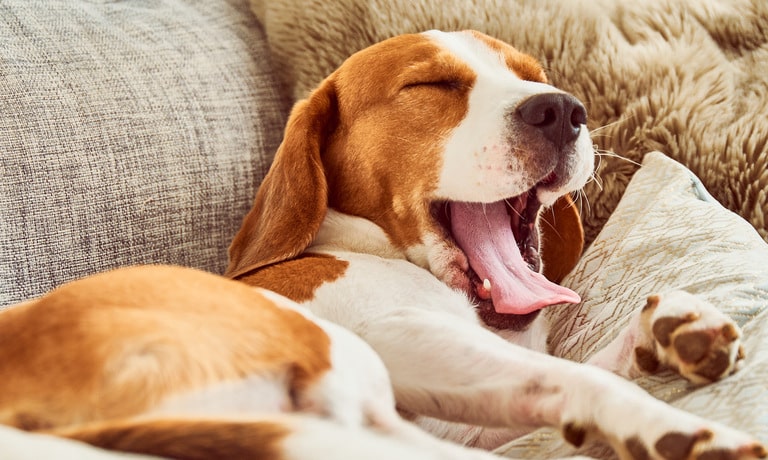
Understanding your dog’s sleeping habits and preferences has more benefits than simply indulging your curiosity. It can give you insight into their health, mood, and even their trust in you. By learning the nuances of your pup’s sleep, you’ll be better equipped to ensure they’re happy, healthy, and well-rested.
How Much Sleep Do Dogs Really Need?
Most dogs sleep between 12 and 14 hours a day, though this number can vary based on breed, age, and activity level. For instance, puppies need 18 to 20 hours to support their growth and development. Senior dogs also tend to sleep more as their energy levels decrease with age. High-energy breeds may sleep less during the day because they’re more active, while calmer breeds often nap longer. Keep in mind that a sudden change in sleep patterns could signal a health issue, keep an eye on your dog while they snooze.
What Do Different Sleeping Positions Mean?
Dogs have some of the most endearing sleeping positions, which can reveal a lot about how they’re feeling. When your dog sleeps curled up in a ball, they’re conserving body heat and protecting themselves. You might also notice “nesting” behavior, where your dog circles or arranges their sleeping spot before nestling in. This instinct comes from creating a safe and comfortable place to rest in the wild. If this is your dog’s go to sleeping habit, you may want to consider choosing a nesting bed for your dog.
The “superman” pose, with all four limbs stretched out, often means your pup is ready to hop back into action at a moment’s notice. Sprawling on their back with paws in the air, however, signals total relaxation and trust since it leaves them vulnerable.
What About Unusual Sleeping Behaviors?
While most sleeping habits are cute or amusing, some might raise questions. Snoring, for instance, is fairly common in breeds with short noses, such as pugs and bulldogs. However, if the snoring becomes too loud, it could indicate nasal blockages. Twitching during sleep is another behavior many dog owners notice, and it’s usually just a sign that your pup is dreaming. However, discuss the behavior with your vet if they twitch excessively or seem distressed.
If your dog is sleeping significantly more or less than usual, it might be a sign of health issues, such as hypothyroidism or pain. Always keep an eye on shifts in sleep patterns and consult a veterinarian if you suspect something isn’t right.
Why Sleep Matters
Understanding your dog’s sleeping habits and preferences is a meaningful way to connect with your companion and monitor their overall well-being. By recognizing what’s normal for your pet, you’re better positioned to notice changes that could point to stress or medical concerns. Take the time to observe their habits and make their sleep environment as comfortable as possible.





